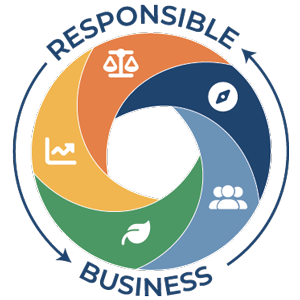

Get Ready for the Future of Business
Online MBA Curriculum
The first and only business program in the country with a focus on responsible business, CSUMB's remote MBA curriculum offers students a chance to encounter in-depth study, group projects, global perspectives, and sophisticated technologies while viewing all facets of business administration through the 5-point lens of Profit, People, Planet, Ethics, and Equity.
Our Online MBA courses provide students with the professional business competencies valued by employers in today's global marketplace.
Responsible Business: Your Key to Business Success
Our Responsible Business website contains innovative, progressive readings and videos that each of our online business MBA students will have access to familiarize themselves with Responsible Business and the Quintuple Bottom Line: profit, people, planet, ethics, and equity.
Created by CSUMB faculty and industry subject matter experts, these articles and videos highlight the important role of Responsible Business in the world. Frequently updated, these links within the courses ensure that students are studying up-to-date examples of companies' success stories.
With a strong focus on quantitative skills, each of our remote MBA courses has been mapped to professional competencies identified by your instructor. Throughout the program, students will have an opportunity to demonstrate their achievement of these competencies.

Graduate with Our Responsible Business Curriculum
Profit
People
Planet
Ethics
Equity
Experiential Learning Opportunities: Gain Real World Responsible Business Experience.
CSUMB’s Online MBA program takes learning beyond the online classroom by incorporating a series of unique experiential educational opportunities that prepare students for real world business management and leadership.
Business Simulations
Build practical skills in our online business simulations that put you in the shoes of a manager.
International Consulting Experience
Our virtual consultancy experience is dedicated to resolving economic disparities and empowering communities to reduce inequalities. Students team up to help local entrepreneurs and small businesses in a developing country resolve current, real-world challenges related to microfinance, marketing, and business plans.
Responsible Business Capstone
An in-depth multi-week experience that will enable you to integrate and apply the knowledge you have acquired in all previous courses, including an assignment in our BUS 694 course, (Business Strategy and Entrepreneurship), to create a start-up social-venture proposal with social impact.
This project [Responsible Business Capstone] has provided me with a deeper understanding of the complexities involved in running a business. A 'good idea' remains just that, unless comprehensive operational plans are developed.
Entrepreneurial Thinking: Characteristics, Benefits, and Steps to Cultivate
Explore the reasons why an entrepreneurial mindset benefits all business professionals, not solely those looking to start businesses. This approach is central to the Online MBA program and examined in depth in the capstone course.
Video Transcript
Entrepreneurial thinking is the kind of approach to problem solving that we teach in entrepreneurship. It involves focusing on a problem that you're trying to solve and testing various ideas for solving that as early and as often, and as quickly and cheaply, as possible. It also involves really owning the problem and the solution and the search for solutions. And so it's a super valuable approach and attitude for people working in big companies as well as startups. It is important for large companies, especially what I would think of as the best companies, the ones that are innovative and, try always solving new problems or trying to solve problems better. The reason that entrepreneurial thinking is important is that it involves creativity and real ownership by employees, by members of a team. So it's the type of work that entrepreneurs have to do and that we teach in our classes, but it applies directly to innovative firms, firms that are growing and firms that are always seeking to do better.
Some of the characteristics of people who think with an entrepreneurial mindset, what they look like is they're quick and decisive, but that's because there's a process in which they take initiative, they own problems, they own solutions, and they are quickly going through creative ideas. They're quickly testing their assumptions, quickly testing hypotheses, ideas. And so what they're able to do is to act with decisiveness and also to do it, again, quickly. And so there's an agility also to the way entrepreneurial thinkers behave and approach problems and solutions.
I think there are two obstacles to people, taking action. One is that they don't know how to start. So what we try to do is break it down. And so we use a lean startup method, which has been really effective. but the other is this fear factor. People are afraid, they're afraid to take this the first step. They're afraid that they might be wrong about something, they're afraid of that they can't, they don't have the skills, the abilities, the capabilities to do something. So for me, breaking down that fear, trying to take that fear away is so hard, but it is so important. And one of the ways that I try to think about that is, let's focus not on possible failure, but instead on the questions, on the things that you have control over, which is let's get answers to some questions. ost people aren't afraid of that. So if we can focus on that process, that scientific process, make that very formal and you know, something that is detached from your own skills, from your own abilities, your own capabilities, things that you fear you don't have. Instead we're focusing on the question. We're focusing on the things that we can do, asking people about, you know, assumptions that we have about hypotheses that we have. If we can do that, we can break down the fear and focus on your curiosity, focus on getting answers, getting data, getting information.
The way to sort of cultivate this mindset is practice. The way we approach teaching this is we start with a problem where students start with the problem and they go through the thought process of: what are some solutions, who are customers who might pay for this sort of thing? And then come up with a list of assumptions that they've made about whether that's about customers, whether it's about solutions, whether it's even about the problem — Is this a problem? they also think about ideas, creative solutions, coming up with hypotheses for what might work and quickly going out to test them, which means talking to people early and often out in the real world, but focusing on whether your assumptions were correct, whether your hypotheses are right, whether your ideas are good, and doing this in a sort of what we would call a scientific approach so that you're getting good answers and good information and possibly even new good ideas. So practicing that, which is say, getting out, talking to people early and often is hard for people to do a lot of times, but getting a little bit of practice, getting some muscle memory is essential to getting that entrepreneurial mindset and then taking all that new information, incorporating that back in without self-recrimination, without creating self-doubt. That's another muscle that we really think is important to exercise.
At Cal State Monterey Bay, we build our whole program around entrepreneurship, entrepreneurial thinking. Our final kind of capstone class is Entrepreneurship and Atrategy. So most, programs, the capstone is a strategy class. It's where all of the other classes that you've had kind of roll up and are, are used together. in a strategic plan, what we do is to bring in that entrepreneurial element. So you're doing what we just talked about, the lean startup method where you're starting up a company, you're using all of the stuff that you've learned throughout the MBA, but here it's for an entrepreneurial project and it's got all of the strategy that you would normally get in a strategy class as well. So, again, this gives you some practice working some muscles that you wouldn't necessarily be doing in a, in a normal strategy class. You're getting that in our Entrepreneurship and Strategy capstone.
Getting Your MBA Online: Course Structure
The Online Master of Business Administration curriculum consists of 30 units delivered in sequence across 11 individual courses. Students take one course at any one time with their cohort. Individual courses are five weeks long. You can complete the program and earn your MBA degree in as few as 16 months.
The University accepts credit for transfer into the program. Students who have completed coursework in another regionally accredited graduate program with a grade of B or better can apply for transfer credit. Credit is granted when the coursework for which credit was earned is deemed to align with the course content, assessments, objectives, and outcomes of one of the courses listed below. A maximum of 9 units can be transferred into the MBA program.
Online MBA Course Sequence
Designed to ensure you get the most out of your MBA online education, our Online business MBA curriculum is comprised of the following 11 courses, which are taken in the sequence listed below:

